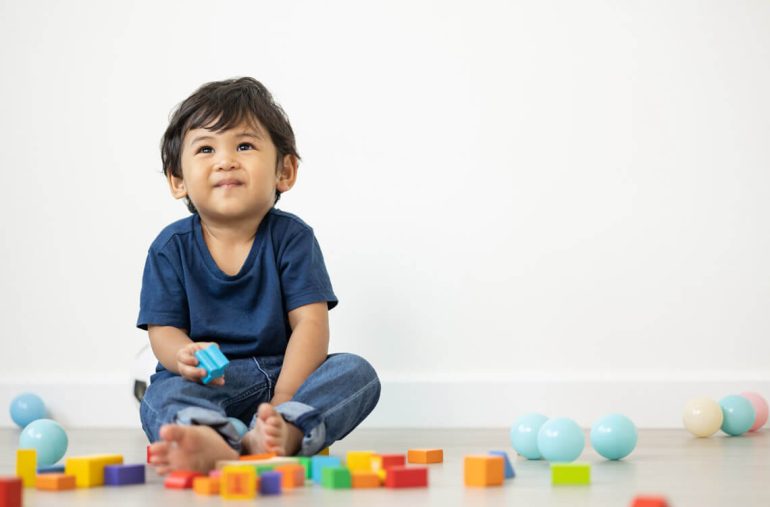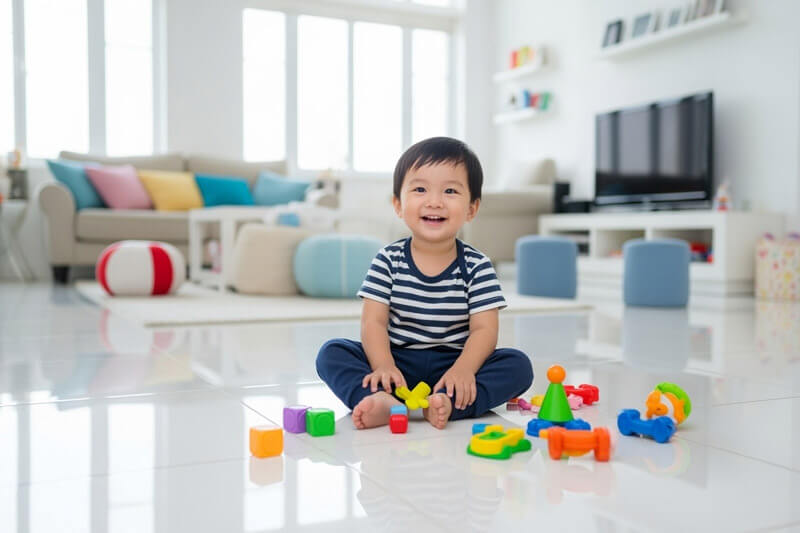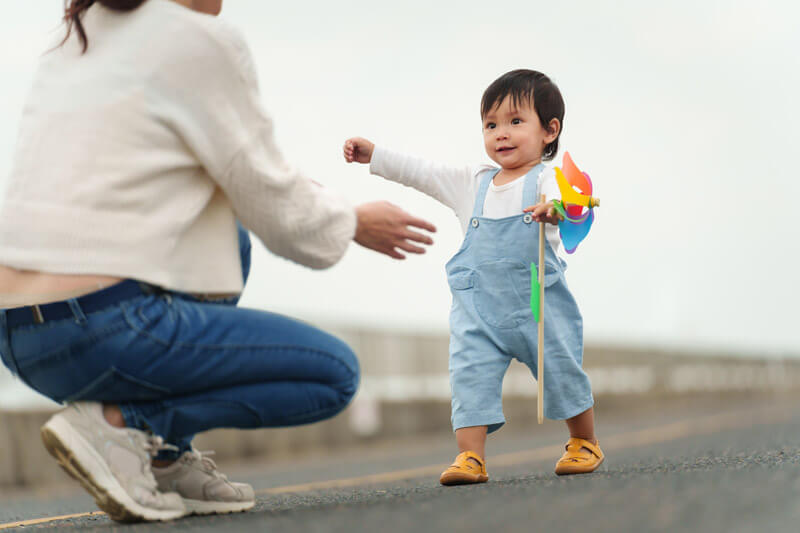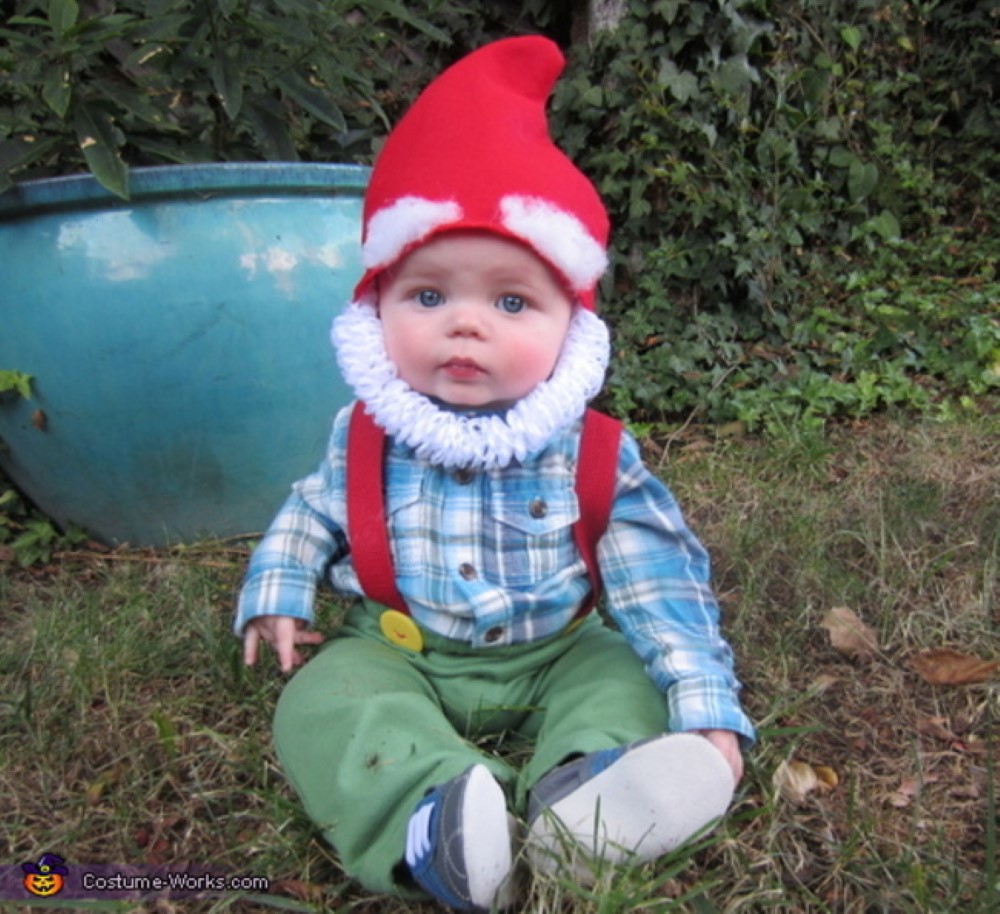At 19 months, your toddler is a bundle of motion, chatter, and curiosity. Their 19-month-old developmental milestones are full of new adventures.
Every day brings something new. A new word, a new climbing attempt, and a new way to express big feelings.
They’re eager to do things on their own, though they still need your gentle guidance and encouragement.
Here’s what to expect as your little explorer achieves their 19-month-old developmental milestones.
Physical & Motor Milestones
Competent Running
Your 19-month-old is likely more coordinated on their feet now, moving quickly from a walk to a run with surprising confidence.
Though they may still stumble, they’re getting better at stopping, turning, and regaining balance.
You might notice them trying to kick or throw a ball, climb stairs with assistance, or push and pull larger toys around the house.
These activities strengthen core muscles, improve balance, and give them a sense of mastery over their body.
Stronger Hand-Eye Coordination
Fine motor development is also taking off at 19 months. Your child may start stacking several blocks, turning book pages (sometimes too fast!), or trying to twist lids off containers.
They may also begin to show a preference for one hand, though true handedness often appears later.
Encourage this progress with toys that challenge their precision — shape sorters, stacking cups, or large crayons for scribbling.
Communication & Cognitive Development
Bursting Vocabulary
Your toddler’s speech is becoming more expressive by the day. Around 19 months, many children use 20 to 50 words, though this varies widely.
They might start combining words like “Mummy, help!” or “want milk”. Even when speech isn’t perfectly clear, their intent is usually obvious through tone and gestures.
Your toddler also understands far more than they can say.
They can follow simple two-step directions (“Please pick up the ball and give it to Daddy.”) and identify familiar objects or people in pictures.
Early Thinking Skills
At this age, cognitive growth is all about problem-solving. Toddlers love figuring out how things work — how to open containers, fit shapes into slots, or make a toy light up.
Their memory is improving, too, so they start to anticipate routines: fetching shoes when you mention “walk” or heading to the bathroom when it’s bath time.
You might also notice the beginnings of imaginative play. A teddy might “drink” from a cup or “go to sleep” under a blanket.
These playful moments show that your toddler’s brain is connecting experiences with meaning — the very start of creative thinking.
Social & Emotional Development
Independence With a Side of Sass
The 19-month-old stage is famous for the word “no”. This isn’t defiance — it’s the early stage of asserting identity.
Your toddler is learning that they’re a separate person, with their own opinions and choices. Expect frustration when things don’t go their way, and remember that emotional regulation is still developing.
Offer empathy when tantrums arise and provide calm boundaries. For example, you can say, “I know you’re upset, but we can’t throw toys.”
Early Social Awareness
Your toddler’s social world is expanding. They’re starting to recognise emotions in others, sometimes offering hugs to a crying friend or showing pride when praised.
Playtime with other toddlers becomes more engaging, even if it’s still mostly side-by-side (known as parallel play).
Encourage this budding social awareness with short playdates or family gatherings.
Over time, these habits blossom into empathy and teamwork.
Sensory & Perceptual Development
Exploring Through Touch
Your toddler’s senses are in overdrive. They love experimenting with textures, sounds, and smells.
Sand, dough, water, fabric — everything becomes a learning opportunity. Sensory play helps them process information and strengthens fine motor control.
Sharper Perception
At 19 months, vision and hearing are sharper and more connected. Your toddler can recognise animals in books, imitate the sounds they make, and dance rhythmically to songs.
They might also remember where objects belong and notice when something is missing — early signs of spatial and visual memory developing.
When to Talk to a Paediatrician
It’s perfectly normal for toddlers to progress at their own pace, but reach out to your paediatrician if your toddler
- isn’t walking independently
- doesn’t use any words or gestures to communicate
- seems uninterested in interacting with people or toys
- if your child doesn’t make eye contact
- shows persistent stiffness or floppiness
- loses previously gained skills.
Early evaluation can uncover underlying issues and help your child get the right support early on.
So, remember to keep track of their 19-month-old developmental milestones to ensure they’re on track.
Expert Tips & Daily Activities
Nature Walks
Outdoor play is one of the best ways to boost your toddler’s physical and emotional growth. Take them for short walks, let them push toy carts, or let them chase bubbles across the yard.
These activities strengthen muscles and coordination while burning off boundless energy.
Naming Objects
Nature walks are excellent too — toddlers love picking up leaves, watching ants, and feeling different textures. Talk about what you see, name colours, and encourage curiosity.
Make-Believe
On quieter days, engage your toddler with imaginative play indoors. Build towers with blocks, draw with large crayons, or act out simple stories using soft toys.
Pretend play helps with emotional expression, while art activities refine fine motor skills and focus.
Predictable Routines
Keep daily routines predictable but flexible. Toddlers thrive on rhythm, but they also benefit from free exploration.
Reading before naps, singing during bath time, and narrating daily events turn ordinary moments into learning opportunities.
Growing Into Confidence
At 19 months, your child is stepping into a world of independence and discovery. They’re stronger, braver, and more determined to explore life on their terms.
Remember to guide your little one with their 19-month-old developmental milestones with patience.
But don’t forget to enjoy the magic of watching confidence bloom one day at a time! You’ve got this, my fellow parents!
Disclaimer: The information provided in this article is for informational purposes only and should not be considered as medical advice from Motherhood. For any health-related concerns, it is advisable to consult with a qualified healthcare professional or medical practitioner.
For more insightful stories and fun recipes, stay tuned to Motherhood Story!













